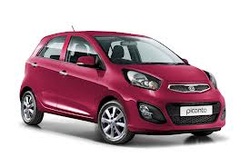
The only thing cheaper than an e-bike...

Maybe you drive a car, or maybe you want to drive a car.
Ever thought about the costs?
Lets consider an entry level class "A" sedan like the Kia Picanto which costs, in today's terms a "modest" R125,000.
According to the AA, the running costs for this car, which include fuel, tyres, servicing and the like for this car are a whopping R1.13 per kilometer. Bear in mind that this car has a tiny 998cc engine.
Stepping up a bit to something like a 1.4L Golf costing R266,000 we find that the running cost per Km jumps to R1.32 / Km.
Ever thought about the costs?
Lets consider an entry level class "A" sedan like the Kia Picanto which costs, in today's terms a "modest" R125,000.
According to the AA, the running costs for this car, which include fuel, tyres, servicing and the like for this car are a whopping R1.13 per kilometer. Bear in mind that this car has a tiny 998cc engine.
Stepping up a bit to something like a 1.4L Golf costing R266,000 we find that the running cost per Km jumps to R1.32 / Km.

Now let's look at the cost of running an e-bike.
What's the cost per Km you might ask? Let's be honest - Lithium batteries don't come cheap, so we need to factor the cost of the battery into the running costs of the bike. Depending on the quality of the battery cells, the battery should be good for around 600 full recharges or 1,200 half recharges. In calculating the per kilometer cost we have taken into account both the cost or recharging the battery and replacing the battery every two and a half to three years.
And the price per Km comes out at just over 10c per Km.
Of course you have to keep your bike clean and look after it and occasionally you might have a puncture and have to service the bike, but the running costs are significantly lower than any other form of transport other than cycling without a motor or perhaps walking.
What's the cost per Km you might ask? Let's be honest - Lithium batteries don't come cheap, so we need to factor the cost of the battery into the running costs of the bike. Depending on the quality of the battery cells, the battery should be good for around 600 full recharges or 1,200 half recharges. In calculating the per kilometer cost we have taken into account both the cost or recharging the battery and replacing the battery every two and a half to three years.
And the price per Km comes out at just over 10c per Km.
Of course you have to keep your bike clean and look after it and occasionally you might have a puncture and have to service the bike, but the running costs are significantly lower than any other form of transport other than cycling without a motor or perhaps walking.
Electric vehicles emit less CO2 - myth or fact
Many sellers of e-bikes will tell you that e-bikes emit less CO2 that do conventional petrol driven motors.
This is not strictly true. It all depends on the source of the electricity. If the source of the electricity is wind, solar or nuclear, this may well be true, but if the source is fossil fuel based, then electric vehicles may emit more CO2 and SO2 pollution than petrol driven engines.
However, when it comes to e-bikes, the truth is that they are hybrid powered, where power is derived both from the motor and from your pedaling. This is why they emit lower less CO2 and SO2 into the air - because you are producing some of the power. In most instances, except where you are riding uphill, you are typically providing more power than the motor.
This is not strictly true. It all depends on the source of the electricity. If the source of the electricity is wind, solar or nuclear, this may well be true, but if the source is fossil fuel based, then electric vehicles may emit more CO2 and SO2 pollution than petrol driven engines.
However, when it comes to e-bikes, the truth is that they are hybrid powered, where power is derived both from the motor and from your pedaling. This is why they emit lower less CO2 and SO2 into the air - because you are producing some of the power. In most instances, except where you are riding uphill, you are typically providing more power than the motor.

